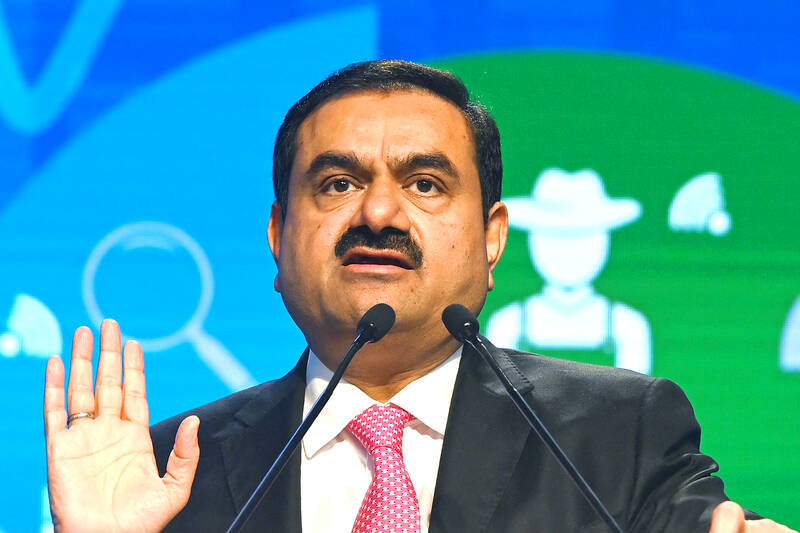Shares in the business empire of Asia’s richest man, Gautam Adani, nosedived yesterday, extending this week’s losses to US$45 billion, days after a US investment firm claimed that Adani Group had committed “brazen” corporate fraud.
Adani, 60, began his week as the world’s third-richest person, but has tumbled down the rankings to seventh on Forbes’ billionaire tracker after losing US$24 billion in yesterday’s trade.
His flagship Adani Enterprises plunged 15 percent in Mumbai, a fall of 508.45 rupees (US$6.24), triggering an automatic trading halt alongside five of its seven main listed subsidiaries.

Photo: AFP
“Obviously, this is panic-selling,” JM Financials equity research chief Ashish Chaturmohta said, adding that traders were creating fresh short-sell positions to protect previously made bullish bets on Adani stocks.
Hindenburg Research this week alleged in a report that Adani Group had used undisclosed related-party transactions and earnings manipulation to “maintain the appearance of financial health and solvency” of its listed business units.
The Indian conglomerate on Thursday said it was the victim of a “maliciously mischievous” reputational attack by Hindenburg just as it was preparing for a major fundraising round.
Hindenburg’s short position in the firm, announced in the report’s release, was proof that the company had a vested interest in driving down Adani stocks, Adani Group legal compliance officer Jatin Jalundhwala said in a statement.
Adani is exploring its punitive action against the research advisory in US and Indian courts, he added.
Hindenburg responded that Adani had ducked the issues its research had raised and instead resorted to “bluster and threats.”
“If Adani is serious, it should also file suit in the US,” the firm said in a statement. “We have a long list of documents we would demand in a legal discovery process.”
Shares in Adani business units have soared as much as 2,000 percent in the past three years, adding more than US$100 billion to its founder’s net worth and vaulting him up the ranks of the world’s richest people.
Adani, who has an estimated fortune of US$95 billion, is considered a close supporter of Indian Prime Minister Narendra Modi.
The report said a pattern of “government leniency towards the group” stretching back decades had left investors, journalists, citizens and politicians unwilling to challenge the group’s conduct “for fear of reprisal.”
“The issues strike at the heart of the Indian corporate sector scene where a number of family-controlled conglomerates dominate,” Global CIO Office CEO Gary Dugan said.
“By their very nature, they are opaque, and global investors have to take on trust the issues of corporate governance,” he said.
Hindenburg’s allegations come as an ambitious US$2.5 billion follow-on public offer — India’s largest ever — opened for bids yesterday, aimed at bolstering the business empire’s balance sheet.
Shares in Adani Enterprises fell to 2,720.90 rupees at their lowest point in the day, below the follow-on public offer price band of 3,112 to 3,276 rupees per share.

Nissan Motor Co has agreed to sell its global headquarters in Yokohama for ¥97 billion (US$630 million) to a group sponsored by Taiwanese autoparts maker Minth Group (敏實集團), as the struggling automaker seeks to shore up its financial position. The acquisition is led by a special purchase company managed by KJR Management Ltd, a Japanese real-estate unit of private equity giant KKR & Co, people familiar with the matter said. KJR said it would act as asset manager together with Mizuho Real Estate Management Co. Nissan is undergoing a broad cost-cutting campaign by eliminating jobs and shuttering plants as it grapples

TEMPORARY TRUCE: China has made concessions to ease rare earth trade controls, among others, while Washington holds fire on a 100% tariff on all Chinese goods China is effectively suspending implementation of additional export controls on rare earth metals and terminating investigations targeting US companies in the semiconductor supply chain, the White House announced. The White House on Saturday issued a fact sheet outlining some details of the trade pact agreed to earlier in the week by US President Donald Trump and Chinese President Xi Jinping (習近平) that aimed to ease tensions between the world’s two largest economies. Under the deal, China is to issue general licenses valid for exports of rare earths, gallium, germanium, antimony and graphite “for the benefit of US end users and their suppliers

Dutch chipmaker Nexperia BV’s China unit yesterday said that it had established sufficient inventories of finished goods and works-in-progress, and that its supply chain remained secure and stable after its parent halted wafer supplies. The Dutch company suspended supplies of wafers to its Chinese assembly plant a week ago, calling it “a direct consequence of the local management’s recent failure to comply with the agreed contractual payment terms,” Reuters reported on Friday last week. Its China unit called Nexperia’s suspension “unilateral” and “extremely irresponsible,” adding that the Dutch parent’s claim about contractual payment was “misleading and highly deceptive,” according to a statement

The Chinese government has issued guidance requiring new data center projects that have received any state funds to only use domestically made artificial intelligence (AI) chips, two sources familiar with the matter told Reuters. In recent weeks, Chinese regulatory authorities have ordered such data centers that are less than 30 percent complete to remove all installed foreign chips, or cancel plans to purchase them, while projects in a more advanced stage would be decided on a case-by-case basis, the sources said. The move could represent one of China’s most aggressive steps yet to eliminate foreign technology from its critical infrastructure amid a